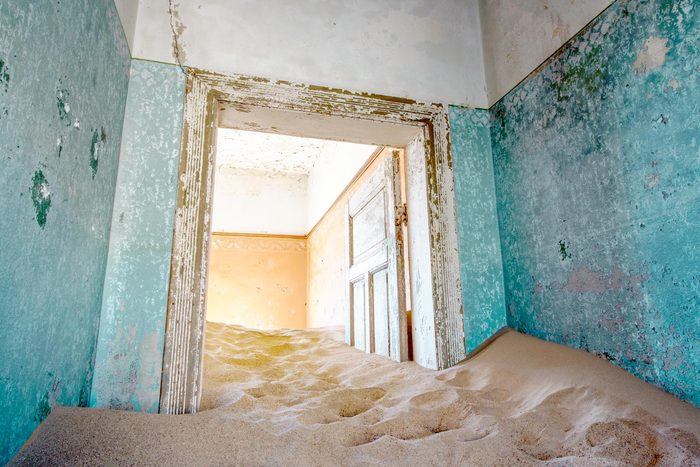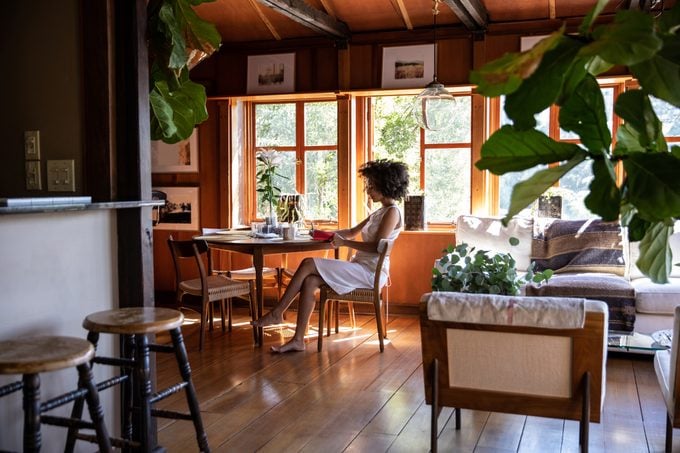What Is “Swedish Death Cleaning”? An Expert Explains Why It’s the Secret to a Happier Life for Americans
Updated: Jul. 21, 2024

It might seem like Marie Kondo gone macabre—but, a happiness psychologist says, "There's not a person walking the earth who is not affected by this."
The idea of preparing for…death…probably doesn’t spark much cheer in most of us. However, Katarina Blom says she’s nailed down an untapped vehicle to joy and serenity in “Swedish death cleaning.”
Blom is a happiness psychologist, mental wellbeing expert and co-host of The Gentle Art of Swedish Death Cleaning on NBC streaming platform, Peacock (executive produced by Amy Poehler). Blom believes that preparing for death, specifically by purging your home of clutter (a practice the Swedish call “death cleaning”), is a powerful way to live a fuller life.
Blom recently partnered with the National Funeral Directors Association to help promote the idea that more people should go through their stuff, organize it and evaluate what you need to keep, sell or give away. Otherwise one day, she says, someone else will have to do it for you.
“Death cleaning” is definitely a different take on the decluttering craze of recent years, but it’s also not that far removed from the popular Scandinavian principle of hygge—the philosophy that a rich, cozy life lies in more minimalistic living. Blom says death cleaning comes from a slightly different philosophy with equally meaningful outcomes.
The Healthy @Reader’s Digest: First of all, why do you think the way you’re talking about death is getting so much attention?
Katarina Blom: Well, I think it makes perfect sense, because as humans we hate pain and we hate discomfort. Evolutionarily we were equipped with a risk aversion, which basically means we want to avoid anything that might be a danger to us or inflict pain on someone else and death is really painful.
Another part is that there’s not really one true way to navigate grief.
This Is What a Near-Death Experience Really Feels Like, According to Science
The Healthy: You’re a psychologist who specializes in happiness. Why do you think the idea of happiness fits with death so naturally?
Katarina Blom: Without death, there is no life. That’s the number-one thing. And without sickness, we can’t feel happy that we’re healthy. So we need the variety of emotions, we need the variety of events in life to feel alive and to feel that we’re learning and we’re expanding.
The Healthy: In addition to fearing death, maybe we also fear what we’re leaving behind. What is death cleaning, for people who have never heard of it?
Katarina Blom: It is really about making sure that you surround yourself by items that carry a purpose here and now for you. And that purpose might be like, Oh, this is reminding me about my years at college or university and it gives me so many fond memories of the people I connected to. But it should be there with intention, on purpose. You can have a maximalist home with a lot of things, but if the things are there on purpose, then that’s your version of death cleaning.
So it’s not about being minimalist, it’s about reflecting on Who am I, what’s my life about? What do I want my home to be like for this last remaining time that I have?
Nate Berkus Just Shared His #1 Best Design Secret for a Better Night’s Sleep
The Healthy: At what point do you recommend someone should commit to their own death cleaning project?
Katarina Blom: It’s so easy that we think about death when we’re old, but I could die tomorrow. So it’s really an ongoing process. As there is change in your life, you will need to do some death cleaning. At some point in our life, there are more clear changes. You move from a house to another, you divorce, you meet a new person, you get kids, maybe you [invite] a parent to live with you. So it’s in these moments that’s really a standing invitation for you to take a bigger grasp on your household. Otherwise you can never be too young to start.

The Healthy: How does death cleaning differ from general organization and decluttering?
Katarina Blom: It’s a lot more focused on purpose—your items have to be either that you use them or they’re meaningful to you. I think it’s really that your home should be a reflection of your current needs and also a reminder that we are not here forever—and do you really, really, really need this thing? Americans that we met, it seems like you have so many duplicates of everything. Whereas in Sweden, you just have simple plain white plates and maybe have a napkin with a Halloween theme or something that you can get rid of just to save some space at home and so on. So look for duplicates that are not really needed.
What Is a ‘Slow Living’ Lifestyle?
The Healthy: Is the goal that it is a weight off of your chest that you’re not leaving a bunch of work for people when you die?
Katarina Blom: Death cleaning is really tying up loose ends. It’s also a lot about preserving your family legacy by handing down items and sharing the stories. Like my grandmother, she had posted little notes on important furniture on important heirlooms: This will go to this person. This is something that I found here.
The Healthy: Can you walk us through some more recommendations?
Katarina Blom: There are two boxes that are classic. The “just for me box” is anything that you have in your house that really won’t give much to someone else, but it gives you a lot. Once you’re dead, they know they can just throw that out because it was mostly meaningful to you.
And then we have the “dilemma box,” which is of course we will find things where we’d be like, Ah, should I let it go or not? And then you put down a date on the box, preferably a month ahead, and then you have to name what’s inside the box. And if you can’t remember it, well then probably you don’t need it that much.
20 Little Things Everyone Forgets to Clean—But Shouldn’t
The Healthy: I have bags from my grandmother but I can’t bear the thought of getting rid of them and feeling guilty, but maybe she would say, “Why do you still have that ugly purse of mine?” I have no idea what was meaningful to her.
Katarina Blom: I think what you’re saying here with the guilt is so common that we keep things and we don’t even know why.
The Healthy: I had two health emergencies as a young mom, and it was really important to me to tell my husband what to do with certain items for our children. Ever since that happened, I always want to about my wishes for when I die. But my husband, he just thinks, “You didn’t die. You’re fine. We’re not going to die.” He doesn’t really want to talk about it.
So I’m curious, as a psychologist who talks about death, how do you recommend discussing these topics between people? Even spouses want to deal with death differently!
Katarina Blom: Oh yeah, definitely. I think it’s important to respect that there are two very opposite needs here in this conversation. And it’s very understandable because you’ve had two very different experiences with death, even though your husband had a close experience because he was scared about you dying. But still, it’s not the same. You’ve had different experiences and it’s natural that you want to approach things differently. It doesn’t have to be black or white. I think it’s really about having a nuanced conversation. People always like to be heard and validated.
So the best thing would be if you could both state your needs and you could also validate each other. Maybe you need to start validating him in order for him to feel less scared about this topic. You can say, “I don’t want to push you into a conversation that you don’t want to have, but at the same time, I need to make a plan for myself and for our kids. It’s very important for me.”
I think stating your need, stating your wish, and also validating the other person, asking maybe, “What does it mean to have this conversation? Why is it so hard? Why don’t you want to go there? I really want to understand this because it’s an important topic for me.”
The Healthy: That’s wonderful advice.
Katarina Blom: I just wish there were more people to raise these kinds of questions because it affects everyone. There’s not a person walking the earth that is not affected by this.












